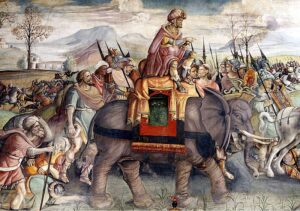In 1535, the Spanish poet, Garcilaso de la Vega, wrote a sonnet about the Holy Roman Emperor Charles V’s campaign against the Ottoman admiral Khair ad-Din, fought in the area around Tunis. In this sonnet, written in the region of the ruins of Carthage, de la Vega posed Charles’ campaign as a resuscitation of Roman military valour and as the resumption of the traditions of the Punic Wars, the conflicts fought between Rome and Carthage in the third and second centuries BCE. From de la Vega’s perspective Charles V was a new Scipio, a modern-day conqueror of Carthage. However, de la Vega ends his poem ‘en llanto y en ceniza me deshago’ – in tears and ashes I am undone. In a seemingly triumphant poem, what does he mean by this?
This talk will consider the meaning of de la Vega’s closing line by examining how the Punic Wars have been used by post-classical epics of empire. Focussing on Latin epic, this talk begins briefly with the reception of the Punic Wars in classical Latin epic, before moving into the Middle Ages and the Latin epic viewed as ’the birth of humanism’s dream’ – Petrarch’s Africa. It closes by looking at how the Punic Wars have been used in modern epics of empire.
In short, this paper asks: what made the Punic Wars such an irresistible point of reference for empires that have sought to assume the imperial mantle of Rome?
This research dialogue forms part of the workshop Reception History and Colonialism organized at the KNIR from 22-24 October in the context of the SECOPS Research Project.
About the speaker
Sam Agbamu is a lecturer in Roman history and Latin literature at the University of Reading, UK.
In 2024, he published a book based on his PhD thesis, Restorations of Empire in Africa (OUP). He is currently completing a Leverhulme Early Career Fellowship on Petrarch’s Africa and its role in developing early modern ideologies of race, empire, and nationhood.


